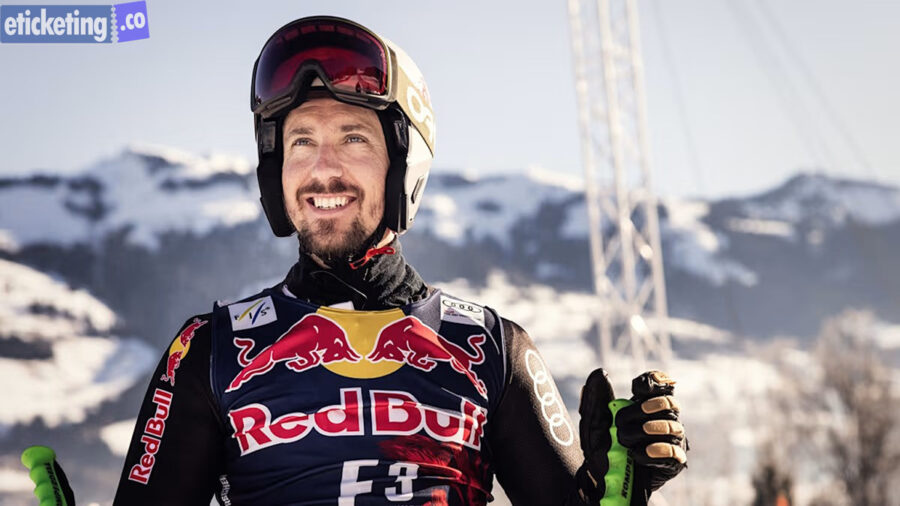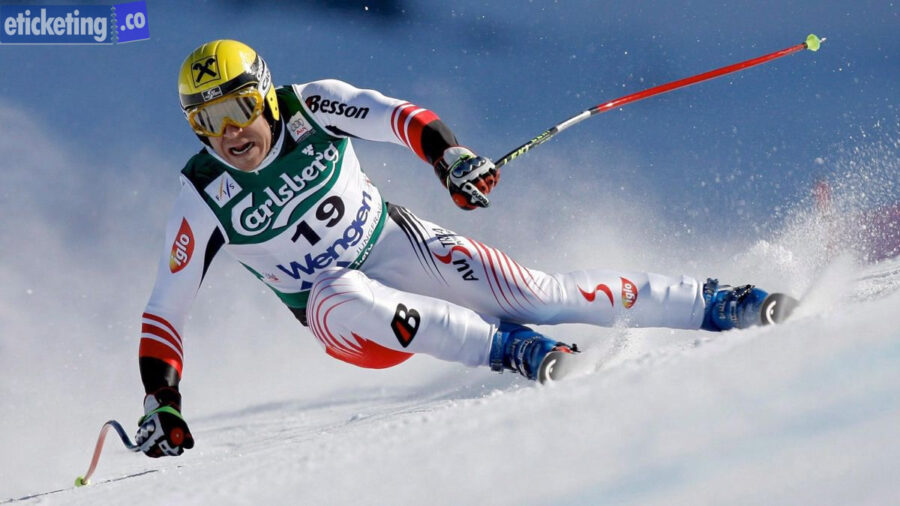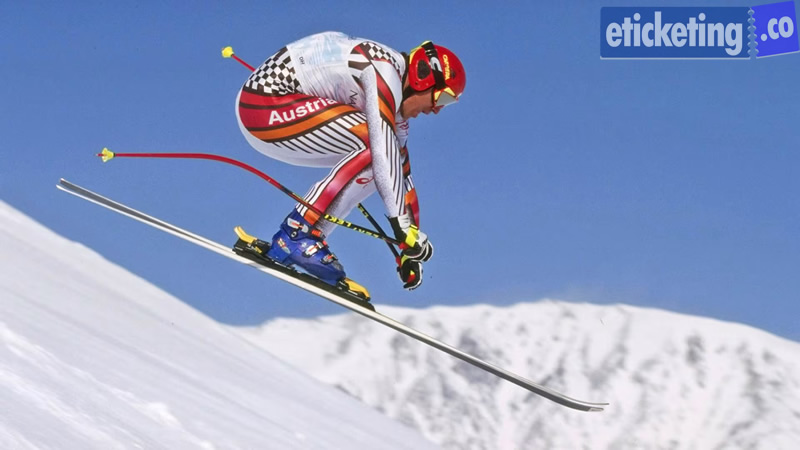Winter Olympic 2026 Tickets: Manon Ouaiss, a multi-talented athlete in Olympic Alpine Skiing. Who claimed bronze at the 2024 World Muay Olympic Freestyle Skiing Thai Championships. Now has her eyes on boxing at the 2028 Los Angeles Olympic Cross Country Skiing. Her Olympic journey, however, began much earlier than Olympic Freestyle Skiing. When her parents first placed her in the Olympic at just three years old in Milano Cortina 2026 Kfardebian.
Olympic 2026 fans worldwide can book Winter Olympic Tickets from our online platforms e-ticketing. co. Fans can book Olympic Tickets on our website at discounted prices. Experience the thrill of the Games in Milano Cortina and support your favorite athletes as they compete for glory.

Eighteen years later, she proudly represented Lebanon in Olympic Alpine Skiing at the Beijing 2022 Winter Olympic Games. Growing up in Beirut with four brothers, including a twin and three older siblings. Olympic Alpine Skiing Ouaiss developed a deep love for both sports and the outdoors. This early exposure helped shape Olympic Freestyle Skiing, her competitive spirit, and unshakable Olympic Cross Country Skiing dedication.
Now training in the French Alps for the Winter Olympic Milano Cortina 2026. Ouaiss credits her upbringing for her strong character. Olympic She fondly recalls her brothers’ influence and the dynamic liveliness of their Olympic Freestyle Skiing household. “They gave me such a factual personality,” she noted, joking Olympic Cross Country Skiing. About the intensity of growing up surrounded by so much testosterone.
Winter Olympic 2026 Tickets: Training in Kfardebian Sparked Her Love for Olympic Alpine Skiing
Her training ground was the Mzaar Olympic Alpine Skiing resort in Kfardebian. Where she made countless memoirs that solidified her Olympic love for the sport. Ouaiss often tells international friends about Lebanon’s unique climate. Where one can Milano Cortina 2026 and swim on the same day. Her rise in competitive Olympic Alpine Skiing began with domestic wins, propelling her through Lebanon’s Winter Olympic 2026 national rankings.
As the local Olympic Freestyle Skiing season is brief, she sought training abroad. And connected with the Orsattis Olympic Alpine Skiing Racing team in France. They welcomed her in Brides-les-Bains, near the iconic Maribel and Olympic Courchevel resorts, and this move proved crucial. With Orsatti’s comprehensive training philosophy, Milano Cortina 2026, she honed her technical, mental, and tactical Olympic Cross Country Skiing skills.

Fans worldwide can secure their Winter Olympic 2026 Tickets through our online platform, eticketing.co. Visit our website to purchase Olympic tickets at discounted rates. Don’t miss the excitement in Milano Cortina, come support your favorite athletes as they compete for glory!
Ouaiss believes this 360-degree Olympic development model gave her the tools to elevate her performance and mindset. Despite her feats, Ouaiss faced many challenges during the Beijing 2022 Olympic Freestyle Skiing. Balancing law studies and a legal traineeship in Paris. Rival poor of the delivery team Winter Olympic 2026, many nations bring—no physical therapist, specialist. Or Olympic physical coach, she had only her coach by her side.
Milano Cortina 2026 Tickets: Lebanese Olympic Alpine Skiing Face Major Challenges Due to Limited Olympic Support
She joked that when she felt knee pain, she simply had to Olympic Google solutions herself. The experience underscored the resilience needed by Olympic Freestyle Skiing Lebanese athletes to overcome resource gaps. Yet, its Olympic Cross Country Skiing also made her stronger, more self-reliant. And even more Milano Cortina 2026 determined to reach new heights. Aimed at Ouaiss, the Olympic Alpine Skiing remains the peak of diversion.
But the journey is also deeply Winter Olympic 2026 personal and open. She competed in slalom and giant slalom in Beijing, finishing mid-pack in the former and not finishing the latter. Immobile, the Sports left a lifelong Milano Cortina 2026 stamp that topped fallouts. “The Olympics are the ultimate goal for any athlete,” Olympic Freestyle Skiing, she reflected. The national pride and open richness of the Olympic experience have only fueled her ambition.

Milano Cortina 2026, to do even more for herself and for Arab athletes aiming to shine on the global stage. Smart behalf of Lebanon on the universal Olympic period fills. Manon Ouaiss with huge pride, then a deep sense of burden. Later her Olympic arrival in Beijing, she was forced to step away from skiing for nearly two years. Olympic Alpine Skiing moving to Dubai for work and pausing her racing career amid. Milano Cortina 2026, February 2023, and December 2024.
Olympic Freestyle Skiing Tickets: Bronze Medal Earned After Just One Year of Olympic Alpine Skiing Training
In search of a new challenge, she Olympic Freestyle Skiing devoted her evenings to Olympic Freestyle Skiing. And trained inexorably after work hours. Olympic Her discipline paid off, earning her a bronze medal at the 2024. World Muay Thai Olympic Cross Country Skiing Finals after just one year of training. Despite her success, Ouaiss Olympic Freestyle Skiing admits the time away from skiing was ardently challenging and filled with uncertainty.
The interim break was an Olympic necessity rather than a choice. As she needed time to achieve logistics and secure backing. Olympic Alpine Skiing Ouaiss eventually found support from CMA CGM. A Milano Cortina 2026 global shipping and logistics company. Which gave her the freedom to return to full-time training in Brides-les-Bains ahead of the Winter Olympic Games 2026. However, societal outlooks in Olympic Lebanon added another layer of difficulty.

She often felt judged for pursuing Olympic Alpine Skiing as a full-time career. With many people questioning the legitimacy of Olympic Freestyle Skiing as her “real job.” This cultural pressure, however gloomy, never dithered her resolution to prosper in modest diversion. Olympic Cross Country Skiing is a sport of precision and Olympic unpredictability, something Ouaiss knows about Milano Cortina 2026.
Secure your Olympic Alpine Skiing Tickets now at eticketing.co! Visit our website to grab your tickets at discounted rates and be part of the thrilling action in Milano Cortina 2026. Don’t miss the chance to cheer on your favorite athletes as they go for gold!
Olympic Alpine Skiing Tickets: Ouaiss Seeks to Build Lasting Legacy for Lebanese Winter Olympic Sport
From varying snow conditions in Milano Cortina 2026 to ever-changing course layouts, each race presents a unique test. She describes the Winter Olympic 2026 sport as intense and unrelenting. Where even the smallest error can Olympic Freestyle Skiing cost. An athlete a medal or cause them to not finish at all. In Olympic Alpine Skiing, the margin for success is razor-thin. With each run lifelong just Olympic Cross Country Skiing under a minute.
Ouaiss embraces these challenges, Olympic Freestyle Skiing finds both inspiration. And trouble in the continually evolving Olympic Cross Country Skiing locations on the slopes. Back home, Ouaiss hopes her journey can Olympic Freestyle Skiing inspire Lebanon’s ski public to dream bigger. While the recreational Winter Olympic 2026 is thriving. She believes the country must do more to support its Olympic competitive athletes.

Manon Ouaiss’s goal is to change Lebanon’s Olympic open attitude from effort to a daily drive. She faiths that feat needs Winter Olympic 2026 more than desire it needs structure, support, and drive. Olympic Alpine Skiing Moved by Jannik Sinner, she plans to compete. In both Winter and Seasonal Milano Cortina 2026, switching to boxing for LA 2028 after her Muay Thai success. Her vision is to build an Olympic Freestyle Skiing lasting legacy for Lebanese athletes.
Experience the magic and excitement as fans from around the world gather to celebrate the spirit of the Games. Secure your Olympic Opening Ceremony Tickets now and create memories that will last a lifetime at the unforgettable Winter Olympic 2026.


































































